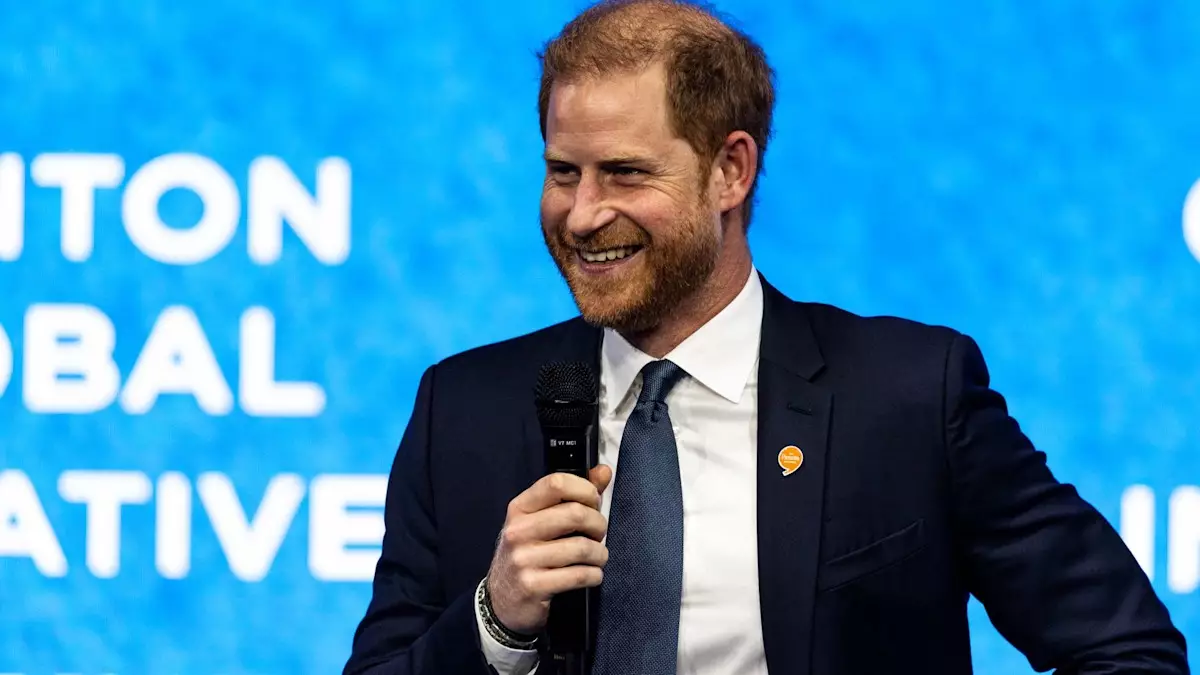During a poignant address at the Clinton Global Initiative in New York, Prince Harry, the Duke of Sussex, illuminated the alarming challenges posed by the online world, particularly concerning the younger generation. He opened with a heartfelt mention of a personal touch—his smartphone’s lock screen features a cherished photo of his children, Prince Archie and Princess Lilibet. This seemingly simple detail laid the groundwork for a deeper discussion about the significant impact of digital interactions on familial relationships and the mental well-being of children. By sharing this personal anecdote, Harry effectively connected with both the audience and the broader dilemma of parenthood in the age of technology.
Harry’s backdrop consisted of images depicting children, a visual reminder of the innocence lost amidst the backdrop of social media’s pervasive influence. The juxtaposition of these joyful faces against the stark realities described by the Duke served to emphasize the alarming consequences that social platforms can have on society. He firmly asserted that the tragedy of losing young lives to the unforeseen repercussions of social media is a harrowing reality too many families face.
Recognizing the Crisis
The fundamental issues Prince Harry addressed are not mere statistics but rather an urgent call to action. He labeled the current climate as one where children are disproportionately affected by negative experiences online, leading to heightened anxiety, depression, and social isolation. This acknowledgment of mental health crises stemming from digital interactions is critical, as it underscores the necessity of addressing these subjects with sincerity and immediacy. It’s not merely rhetoric; it’s a pressing reality that requires a collaborative effort to tackle systemic failures within digital spaces.
Harry’s message resonates as he advocates for the establishment of a safer and more supportive online environment. His creation of the Archewell Foundation’s Parents Network reflects a commitment to empowering parents whose children are navigating the treacherous waters of social media. By fostering a community that offers guidance, education, and support, Harry is striving to mitigate the risks posed by an increasingly digital world.
During his speech, Harry called for a reevaluation of how society and tech companies approach the online experience. He stressed that we must not perceive the digital landscape merely as a tool for profit and competition but rather as a space requiring ethical stewardship and responsibility. The age of technology demands a shift in thinking, where the well-being of users, particularly children, is prioritized over growth metrics and financial gain.
In his remarks, Harry pointed out that the problems stemming from social media are not limited to anecdotal evidence; they are real and widespread. Reports indicating the rise of mental health issues among youth are alarming, suggesting an epidemic that we can no longer afford to overlook. Such a state of affairs necessitates a collective response from parents, educators, and policymakers to develop comprehensive strategies aimed at protecting young users from harm.
Prince Harry’s speech also featured a nostalgic nod to the wisdom gleaned from his own childhood experiences. His acknowledgment of the mischief often accompanying youth highlights the universal nature of growing up, albeit with a critical twist. He noted that while “kids will be kids,” today’s children are facing unprecedented challenges that demand proactive intervention. The harmful design elements of social media serve to exacerbate these vulnerabilities, leading to a targeted environment where the risks are magnified.
Furthermore, Harry’s engagement with organizations such as The Halo Trust, which works to clear landmines and unexploded devices, further reveals his commitment to humanitarian causes. This continuous dedication to impactful work reflects not only a personal legacy linked to his mother, Princess Diana, but also a hopeful vision for a world where the principles of safety and care extend beyond physical well-being to encompass the digital realm.
As the Duke concluded his address, he left the audience with a compelling reminder: the online world must evolve into a space that fosters growth, connectivity, and safety rather than instability and harm. With a clear focus on building a supportive environment for the youth of today and tomorrow, Harry’s initiatives and advocacy efforts represent a critical step towards realizing this vision. It is imperative that we all take heed of his call for collective action as we navigate the complexities of digital innovation amid an evolving societal landscape.

